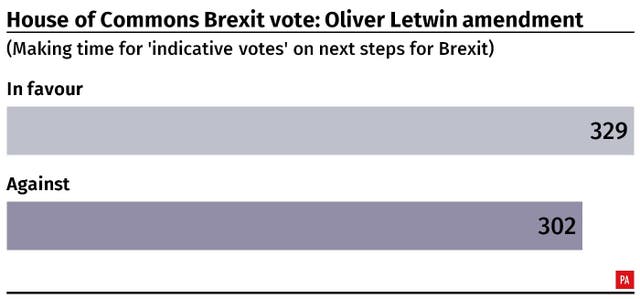
MPs have voted for an amendment enabling them to take control of Commons business and stage a series of “indicative” votes on the way forward for Brexit.
READ MORE: Speaker John Bercow apologises after causing Commons uproar with Tory MP insult
– How will that work?
At 2pm on Wednesday, normal proceedings in the House will stop and MPs will then consider a backbench motion setting out the future Commons business, including the arrangements for staging indicative votes on the various options put forward.
If more than one business motion is tabled, it will be up to the Speaker John Bercow to decide which one is selected.
 Oliver Letwin tabled the amendment (Dominic Lipinski/PA)
Oliver Letwin tabled the amendment (Dominic Lipinski/PA)
The architect of the amendment, Tory former minister Sir Oliver Letwin said he hoped to be able to work with both the Government and the Labour frontbenches in coming to an agreement on how it should actually work.
After a debate lasting up to an hour, the Commons will then start to consider the various propositions that are put forward.
READ MORE: MPs seize control of Brexit as Theresa May left humiliated
– How long will that take?
It’s not clear, although Sir Oliver suggested it could be quite a lengthy process covering several sitting days, as the House whittles down the various options to one which can command a Commons majority.
He proposed they begin on a “plain vanilla basis” with MPs casting their votes on the various propositions on paper slips at the end of the first debate rather than going through the lobbies in a series of divisions which is the normal practice.
 Result of the House of Commons vote on Oliver Letwin amendment (PA Graphics)
Result of the House of Commons vote on Oliver Letwin amendment (PA Graphics)
He said that should stop MPs trying to “game” the outcome based on the sequence in which the votes are called.
Once they they have established which of the proposals have “significant” support, he said a way would have to be found – possibly through some form of preferential voting system – to “zero in” on the one around which a majority of MPs could coalesce.
– Which options are likely to be considered?
It will be up to the Speaker, but Sir Oliver said he believed all “serious” proposals that were put forward should have a chance to be debated.
At one end of the spectrum that could include a second referendum or revoking the Article 50 withdrawal process altogether. At the other it could include a no-deal Brexit, leaving the EU on World Trade Organisation terms.
In between, there could be proposals for a “softer” Norway-style Brexit – sometimes called Common Market 2.0 – the customs union plan favoured by Labour, and a “harder” Canada-style free trade deal.
– What is the Government’s response?
Ministers have warned it sets a “dangerous, unpredictable precedent” while Theresa May has said she will not necessarily be bound by the results – particularly if they are “undeliverable” by the EU.
That prompted Tory former minister Nick Boles to warn that MPs could bring forward legislation forcing the Government to act if ministers try to ignore the wishes of Parliament.
– How long have they got to sort this out?
The clock is ticking. Last week the EU gave Mrs May until April 12 to come forward with an alternative plan if she cannot finally get her twice-rejected Brexit deal through the Commons in a “meaningful vote” this week.
READ MORE: Brexit: What are the indicative votes MPs have secured and how will they work?



Why are you making commenting on The Herald only available to subscribers?
It should have been a safe space for informed debate, somewhere for readers to discuss issues around the biggest stories of the day, but all too often the below the line comments on most websites have become bogged down by off-topic discussions and abuse.
heraldscotland.com is tackling this problem by allowing only subscribers to comment.
We are doing this to improve the experience for our loyal readers and we believe it will reduce the ability of trolls and troublemakers, who occasionally find their way onto our site, to abuse our journalists and readers. We also hope it will help the comments section fulfil its promise as a part of Scotland's conversation with itself.
We are lucky at The Herald. We are read by an informed, educated readership who can add their knowledge and insights to our stories.
That is invaluable.
We are making the subscriber-only change to support our valued readers, who tell us they don't want the site cluttered up with irrelevant comments, untruths and abuse.
In the past, the journalist’s job was to collect and distribute information to the audience. Technology means that readers can shape a discussion. We look forward to hearing from you on heraldscotland.com
Comments & Moderation
Readers’ comments: You are personally liable for the content of any comments you upload to this website, so please act responsibly. We do not pre-moderate or monitor readers’ comments appearing on our websites, but we do post-moderate in response to complaints we receive or otherwise when a potential problem comes to our attention. You can make a complaint by using the ‘report this post’ link . We may then apply our discretion under the user terms to amend or delete comments.
Post moderation is undertaken full-time 9am-6pm on weekdays, and on a part-time basis outwith those hours.
Read the rules hereLast Updated:
Report this comment Cancel